#pablo loved matilde
Text

.。*♡ Brazilian poems that I'm convinced Rook would write for his lover.
.。*♡ A/N: I start working at a new company tomorrow and writing for Rook calms me lol. Spend like 30 to 40 minutes searching for some poems and I really think all these capture his uniques vibes while also being really sweet. The authors names are also there in case my br mutuals want to search for more. Enjoy!

☆"I want every day of the year, every day of your life, every half an hour, every 5 minutes, you tell me: I love you. - Carlos Drummond de Andrade."
☆ "Thou wert also a little leaf, that trembled in my chest. Life's wind placed thee there. At first, I saw thee not: nor knew that thou went with me until thy roots passed through my chest, joined with the threads of my blood, spoke through my mouth, blossomed with me. - Pablo Neruda."
☆ "Freedom in life is having a love to hold on to. - Zack Magiezi."
☆ "When I love you I obey the stars. A number presides over our meeting in darkness. We come and go like days and nights, seasons and tides, water and land. Love, breath of our secret ocean. - Lêdo Ivo."
☆"I look for you in good things, in none of them do I find you completely, in each one I inaugurate you. - Alice Ruiz."
☆ "Love is that surprise party that you don't really know when it's going to happen. - Fabrício Carpinejar."
☆ "I could ride my bike across the city just to see you dance. And that says a lot about my rib cage. - Matilde Campilho."
☆ "What can a creature but, among other creatures, love? Love and forget, love and fall apart, love, unlove, love? Always, and even with glassy eyes, love? - Carlos Drummond de Andrade."
☆ "Deny me bread, air, light, spring, but never your laughter, because then I would die. - Pablo Neruda."
#twst rook#twst rook hunt#rook hunt#twisted wonderland#rook x mc#rook x reader#rook x yuu#rook x y/n#rook x you#rook hunt x reader#rook hunt x mc#rook hunt x yuu#rook x vil#rookvil#vilrook
104 notes
·
View notes
Text
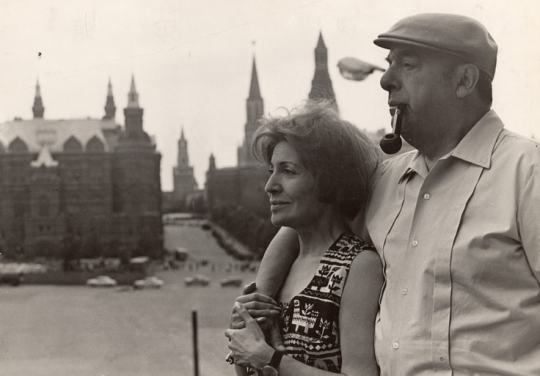
"Sonnet XVII" is a renowned poem written by the Chilean poet Pablo Neruda. It is part of his collection "One Hundred Love Sonnets" ("Cien sonetos de amor"), published originally in Spanish in 1959. Neruda wrote the collection as a declaration of love for his third wife, Matilde Urrutia, with whom he had an affair during his second marriage.
In "Sonnet XVII," Neruda expresses his deep affection and admiration for his beloved, using vivid and imaginative language to depict the intensity of his emotions. The poem explores the theme of love's transcendence, celebrating the unique qualities and beauty of the beloved. Neruda's words convey a sense of overwhelming love, describing his devotion as both physical and spiritual.
The sonnet is considered one of his most popular and beloved works, capturing the universal essence of love and the power of words to express profound emotions.
One Hundred Love Sonnets: XVII
Translated by Mark Eisner
I don’t love you as if you were a rose of salt, topaz,
or arrow of carnations that propagate fire:
I love you as one loves certain obscure things,
secretly, between the shadow and the soul.
I love you as the plant that doesn’t bloom but carries
the light of those flowers, hidden, within itself,
and thanks to your love the tight aroma that arose
from the earth lives dimly in my body.
I love you without knowing how, or when, or from where,
I love you directly without problems or pride:
I love you like this because I don’t know any other way to love,
except in this form in which I am not nor are you,
so close that your hand upon my chest is mine,
so close that your eyes close with my dreams.
[Courtship Academy]
#love#poem#poetry#Pablo Neruda#my favorites#words and writing#reading and writing#Mark Eisner#love Sonnets
16 notes
·
View notes
Photo


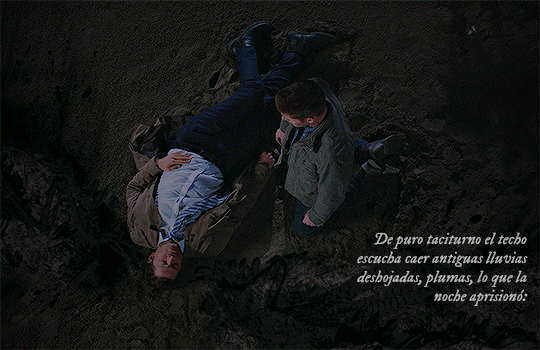

Matilde, where are you? I noticed, downwards,
under my necktie, above my heart,
a certain melancholy between my ribs:
it was that you suddenly were absent.
I missed the light of your energy
and I looked about, devouring hope,
I looked at the emptiness that is a house without you,
nothing is left but tragic windows.
Taciturn, the roof listens
to the falling of ancient leafless rains,
feathers, that which the night imprisoned:
and thus I await you like a lonely house
and you will return to see me and inhabit me.
Otherwise my windows ache.
- pablo neruda love sonnet LXV for @universalcas spanish + destiel celebration
#destiel#destieledit#deancas#deancasedit#my gifs#my edits#i'm SO SORRY vero#someone had already done the happier poem that i had picked originally#i cried a lot making this lol
81 notes
·
View notes
Text

YOU ARE THE LOVE OF MY LIFE.
Si alguna vez tu pecho se detiene,
si algo deja de andar ardiendo por tus venas,
si tu voz en tu boca se va sin ser palabra,
si tus manos se olvidan de volar y se duermen,
Matilde, amor, deja tus labios entreabiertos
porque ese último beso debe durar conmigo,
debe quedar inmóvil para siempre en tu boca,
para que así también me acompañe en mi muerte.
Me moriré besando tu loca boca fría,
abrazando el racimo perdido de tu cuerpo,
y buscando la luz de tus ojos cerrados.
Y así cuando la tierra reciba nuestro abrazo
iremos confundidos en una sola muerte
a vivir para siempre la eternidad de un beso.
Cien Sonetos de Amor, Pablo Neruda.
0 notes
Text
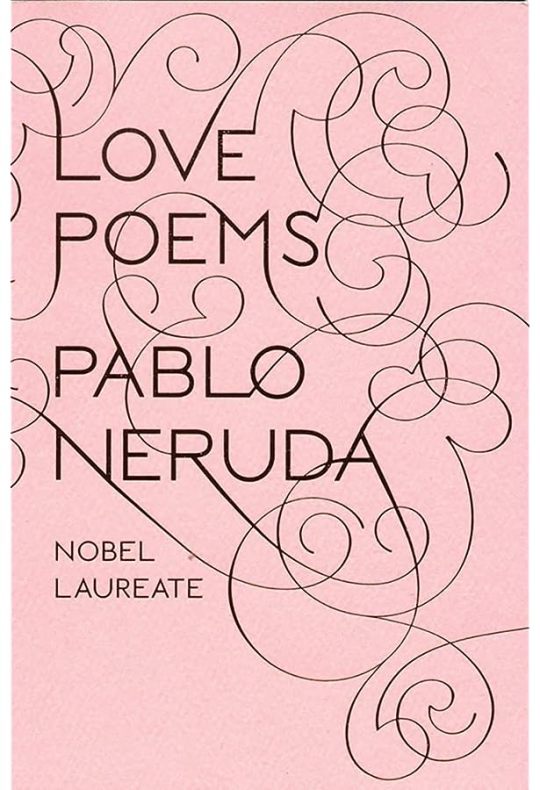
Charged with sensuality and passion, Pablo Neruda's love poems caused a scandal when published anonymously in 1952. In later editions, these verses became the most celebrated of the Noble Prize winner's oeuvre, captivating readers with earthbound images that reveal in gentle lingering lines an erotic re-imagining of the world through the prism of a lover's body: "today our bodies became vast, they grew to the edge of the world / and rolled melting / into a single drop / of wax or meteor...." Written on the paradisal island of Capri, where Neruda "took refuge" in the arms of his lover Matilde Urrutia, Love Poems embraces the seascapes around them, saturating the images of endless shores and waves with a new, yearning eroticism. This wonderful book collects Neruda's most passionate verses.
Publisher:New directions
Pablo Neruda was born in 1904 in the town of Parral in Chile. He received numerous prestigious awards for his work, including the International Peace Prize in 1950, the Lenin Peace Prize and the Stalin Peace Prize in 1953. In 1971, he won the Nobel Prize for Literature. Two years later he died of leukemia in Santiago, Chile.
Found on:https://www.amazon.co.uk
1 note
·
View note
Text
Forensic study finds Chilean poet Pablo Neruda was poisoned
Sam Jones in Madrid
and John Bartlett in Santiago
Tue 14 Feb 2023 09.58 EST
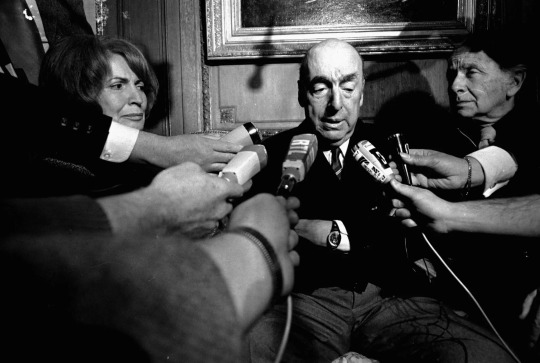
Pablo Neruda talks to reporters in Paris after being named the 1971 Nobel laureate for literature. Photograph: Laurent Rebours/AP
One of the most enduring mysteries in modern Chilean history may finally have been solved after forensic experts determined that the Nobel prize-winning Chilean poet Pablo Neruda died after being poisoned with a powerful toxin, apparently confirming decades of suspicions that he was murdered.
According to the official version, Neruda – who made his name as a young poet with the collection Twenty Poems of Love and a Song of Despair – died from prostate cancer and malnutrition on 23 September 1973, just 12 days after the military coup that overthrew the democratically elected socialist government of his friend, President Salvador Allende.
But some, including Neruda’s nephew, Rodolfo Reyes, have long believed he was murdered because of his opposition to the then incipient dictatorship of Augusto Pinochet.
Ten years ago, a Chilean judge ordered the exhumation of the poet’s remains after his former chauffeur, Manuel Araya, revealed that an agitated Neruda had called him from the Santiago hospital where he was being treated to say that he had been injected in the stomach while asleep. The poet died hours later.
Samples of Neruda’s remains were dispatched to forensic laboratories in four countries for analysis, and in 2015 the Chilean government said it was “highly probable that a third party” was responsible for his death. Two years later, a team of international scientists said they were “100% convinced” the poet did not die from prostate cancer.
On Monday, Reyes said scientific tests had shown the toxin clostridium botulinum was present in his uncle’s body when he died, suggesting he was indeed “poisoned” in the aftermath of the coup. The results of expert analysis are due to be published in a report on Wednesday.
“We now know that there was no reason for the clostridium botulinum to have been there in his bones,” Reyes told the Spanish news agency Efe. “What does that mean? It means Neruda was murdered through the intervention of state agents in 1973.”
The bacteria, which produce the neurotoxin that causes botulism, were discovered on one of Neruda’s exhumed teeth in 2017. Reyes said analysis by experts at McMaster University in Canada and the University of Copenhagen had established the bacteria did not find their way into Neruda’s body from the coffin or the surrounding area.
“We’ve found the bullet that killed Neruda, and it was in his body,” Reyes told Efe. “Who fired it? We’ll find out soon, but there’s no doubt Neruda was killed through the direct intervention of a third party.”
Pinochet’s US-backed coup, during which Allende killed himself as troops stormed the presidential palace, devastated Neruda and led him to plan an exile in Mexico.
But a day before his planned departure, he was taken by ambulance to the hospital in the Chilean capital where he had been treated for cancer and other conditions. He died there on the evening of 23 September, purportedly from the wasting effects of the prostate cancer that had first been detected four years earlier.
However, the official version of the events surrounding his death has frequently been called into question. Gonzalo Martínez Corbalá, who was Mexico’s ambassador to Chile at the time of the coup, told the Associated Press he had seen Neruda two days before his death, and that the poet had weighed almost 100kg (15st 10lbs) – contradicting claims that he was fatally malnourished because of his cancer.
Last month, Araya told AP that if Neruda “hadn’t been left alone in the clinic, they wouldn’t have killed him”.
The chauffeur said he and Neruda’s wife, Matilde Urrutia, had been at the couple’s mansion to pick up their suitcases for Mexico when the poet rang, asking them to come back to the hospital quickly. Neruda died later the same day.
Following Neruda’s death Urrutia maintained that he had been increasingly agitated as he learned of the early atrocities of the dictatorship and that it was the anguish of the coup d’état which led to his demise.
The lengthy investigation hit a number of obstacles, from non-cooperation on the part of the clinic where the alleged injection was administered to difficulty in funding foreign lab tests.
In the years after Neruda’s death, much of the focus has been on locating a mysterious “Dr Price” who had apparently been on duty at the clinic that night. However, there was no mention of the doctor in the records of Chile’s medical union, and it was eventually deduced that he had been invented to stall investigations.
Though described by his friend Gabriel García Márquez as “the greatest poet of the 20th century in any language”, Neruda’s reputation has been damaged in recent years by details of his personal life. Not only was the writer a self-confessed rapist, he was also a man who abandoned his first wife and their daughter, Malva Marina, who was born with a neurological disorder and died at the age of nine.
In his posthumously published memoirs, Confieso Que He Vivido (I Confess That I Have Lived), Neruda admitted raping a Tamil woman who worked as his servant when he was posted to Ceylon as a young diplomat. After describing the rape, he wrote: “She was right to despise me.”
The rape confession, which resurfaced almost five years ago, led human rights activists to oppose an attempt to rename Santiago airport in honour of the poet.
Speaking at the time, the author and women’s rights campaigner Isabel Allende told the Guardian that Neruda’s criminal and callous behaviour did not devalue his work.
“I am disgusted by some aspects of Neruda’s life and personality,” she said. “However, we cannot dismiss his writing. Very few people – especially powerful or influential men – behave admirably. Unfortunately, Neruda was a flawed person, as we all are in one way or another.”
The Associated Press contributed to this report.
#Pablo Neruda#Ricardo Eliécer Neftalí Reyes Basoalto#Chile#Isabel Allende#clostridium botulinum#Augusto Pinochet#Nobel prize
0 notes
Text

—Pablo Neruda, from One Hundred Love Sonnets XVII
#i wanna be loved the way#pablo loved matilde#poetry#quotes#chaotic academia#light academia#dark academia#cottagecore#dead poets society#pablo neruda#poems#love poetry#literature#romantic academia#romanticism#studio ghilibi#theme: love
1K notes
·
View notes
Text
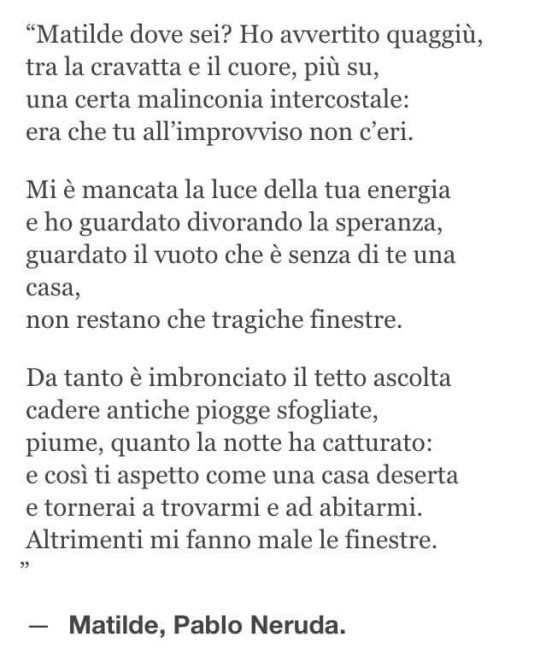
#poesia#poetic#thinking#amore#love#versi#pensieri sparsi#pablo neruda#Matilde#finestre#canto#poesia neruda#neruda#citazioni
14 notes
·
View notes
Photo
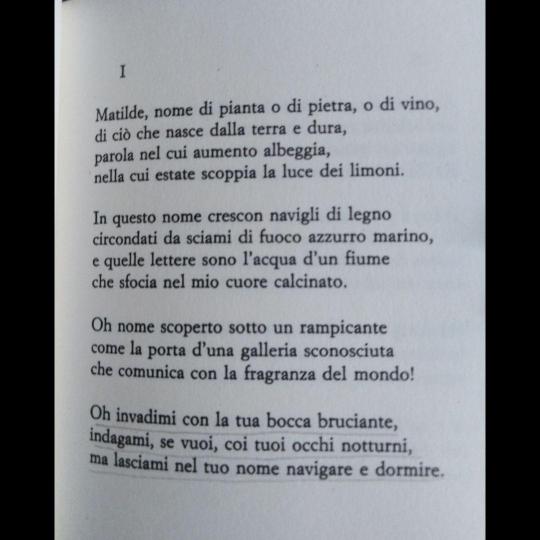
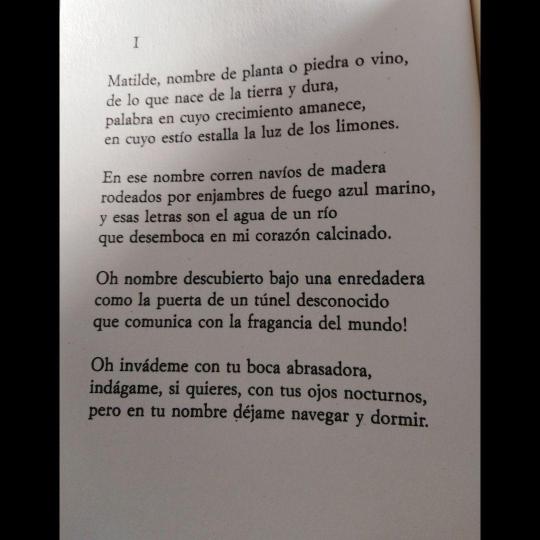
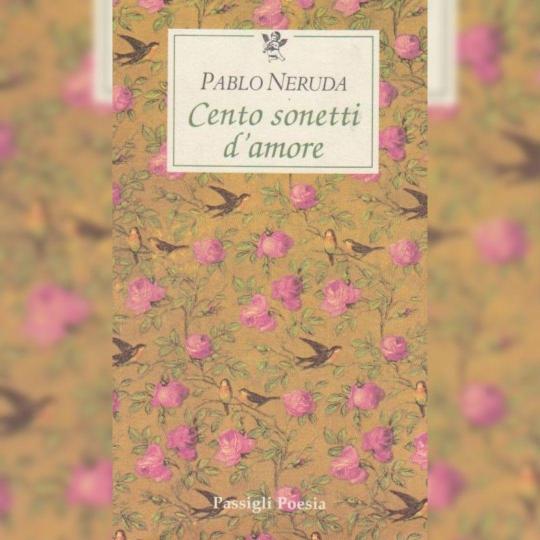
Pablo Neruda, Cento sonetti d'amore
Mañana, I
Matilde, nome di pianta o di pietra, o di vino, Di ciò che nasce dalla terra e dura, Parola nel cui aumento albeggia, Nella cui estate scoppia la luce dei limoni. In questo nome crescon navigli di legno Circondati da sciami di fuoco azzurro marino, E quelle lettere sono l'acqua d'un fiume Che sfocia nel mio cuore calcinato. Oh nome scoperto sotto un rampicante Come la porta d'una galleria sconosciuta Che comunica con la fragranza del mondo! Oh invadimi con la tua bocca bruciante, Indagami, se vuoi, coi tuoi occhi notturni, Ma lasciami nel tuo nome navigare e dormire.
#neruda#pablo neruda#sonetti#cento sonetti d'amore#ciento#spanish#chile#literature#letteratura#reading#parole#poesie#poetry#poet#poetry community#love#amore#matilde#nome#poesia#manana
1 note
·
View note
Quote
I love you without knowing how, or when, or from where.
I love you simply, without problems or pride.
I love you in this way because I do not know any other way of loving but this, in which there is no I or you, so intimate that your hand upon my chest is my hand, so intimate that when I fall asleep your eyes close.

13 notes
·
View notes
Text
SONNET XCIII
If some time your breast pauses, if something stops
moving, stops burning through your veins,
if the voice in your mouth escapes without becoming word,
Matilde, my love, leave your lips half-open:
because that final kiss should linger with me,
it should stay still, forever, in your mouth,
so that it goes with me, too, in my death.
I will die kissing your crazy cold mouth,
caressing the lost buds of your body,
looking for the light of your closed eyes.
And so when the earth received our embrace
we will go blended in a single death, forever
living the eternity of a kiss.
-Pablo Neruda, One hundred love Sonnets
1 note
·
View note
Text
~ میں خاموش ہوجانا چاہتا ہوں ~
پابلو نیرودا
اب وہ مُجھے سکون سے چھوڑ سکیں گے
مرے نہ ہونے کی اُنھیں
عادت ہوجائے گی
میں اپنی آنکھیں بند کرنے لگا ہوں
مُجھے فقط پانچ چیزیں چاہئیں
پانچ چُنندہ جڑیں
ایک تو نامختتم مُحبت ہے
دوسری میں خزاں کو دیکھنا چاہتا ہوں
جدائی بنا مرا وجود بے معنی ہے
بلندی کی طرف پرواز کرنا
پھر پلٹ کر زمیں کی طرف لوٹنا چاہتا ہوں
تیسری نرم و لطیف زمستاں ہے
برستی بارش جو مُجھے محبوب تھی
الاؤ کی لپٹ پُرخراش سردی میں
چوتھی وہ گرمی کی حدت ہے
جو کسی تربوز کی جیسی تراوٹ بخش ہو
اور پانچویں ، تُمھاری آنکھیں ہیں
میٹلیڈ ،
میری محبوب،
تری آنکھوں کے بنا
خواب نگر کا راہی نہ بنوں گا
تری دید کے بناء میں جی نہ پاؤں گا
میں بہار کو ترے لئے مجبور کروں گا
کہ تری آنکھوں کو اپنے جلو میں لے کے آئے
عزیزو ،
یہ ہی سب کُچھ ،
جو مُجھے مطلوب ہے
کُچھ بھی نہیں ،
اور سب کُچھ
اب اگر وہ جانا چاہیں
تو الوداع !
میں اتنا جی چُکا ہوں
کہ اک دن
اُنھیں مجھے بُھلانے کے لئے
مشقت کرنی پڑے
تختہِ سیاہ سے مُجھے مٹانا پڑے
مرا قلب لامُتناہی تھا
میں اُس سے
خامشی کی گزُارش جو کروں
اس سے یہ نہ سُمجھنا
میں مرنے لگا ہوں
اس کا مُتبادل ہی سچ ہے
میں جیتا رہوں گا
یہ طے ہے
رہوں گا اور رہتا رہوں گا
میں نہیں رہوں گا ،
بحرحال ،
مرے اندر
وہ فصل نہ اُگ پائی
زمیں کا سینہ چیرتے ہوئے نکل آئی ہے
روشنی کو پہُنچنا چاہتی ہیں
لیکن مادرِ ارض سیاہ تہار ہے
اور میں خود اپنے اندر
پرت در پرت تاریک ہوں
میں وہ کنواں ہوں
جس کے پانی میں
رات ستارے چھوڑ کر
اکیلے کھیتیوں کو نکل پڑتی ہے
اتنا جینے کا معاملہ سنجیدہ سوال ہے
کہ میں اتنا ہی اور جینا چاہتا ہوں
مُجھے اپنی آواز کبھی اتنی صاف محسوس نہ ہوئی
اور بوسوں سے اتنا مزین نہیں رہا
ابھی ،
ہمیشہ کی طرح ،
قبل از وقت ہے
روشنی شہد کی مکھیوں کا چھتہ ہے
مُجھے دن کے ساتھ اکیلا چھوڑ دو
میں پھر سے جینے کے لئے
جدا ہونا چاہتا ہوں
~ I Ask For Silence ~
Poet : Pablo Neruda
Now they can leave me in peace,
and grow used to my absence.
I am going to close my eyes.
I only want five things,
five chosen roots.
One is an endless love.
Two is to see the autumn.
I cannot exist without leaves
flying and falling to earth.
The third is the solemn winter,
the rain I loved, the caress
of fire in the rough cold.
My fourth is the summer,
plump as a watermelon.
And fifthly, your eyes.
Matilde, my dear love,
I will not sleep without your eyes,
I will not exist but in your gaze.
I adjust the spring
for you to follow me with your eyes.
That, friends, is all I want.
Next to nothing, close to everything.
Now they can go if they wish.
I have lived so much that some day
they will have to forget me forcibly,
rubbing me off the blackboard.
My heart was inexhaustible.
But because I ask for silence,
don’t think I’m going to die.
The opposite is true;
it happens I’m going to live.
To be, and to go on being.
I will not be, however, if, inside me,
the crop does not keep sprouting,
the shoots first, breaking through the earth
to reach the light;
but the mothering earth is dark,
and, deep inside me, I am dark.
I am a well in the water of which
the night leaves stars behind
and goes on alone across fields.
It’s a question of having lived so much
that I want to live that much more.
I never felt my voice so clear,
never have been so rich in kisses.
Now, as always, it is early.
The light is a swarm of bees.
Let me alone with the day.
I ask leave to be born.
1 note
·
View note
Photo
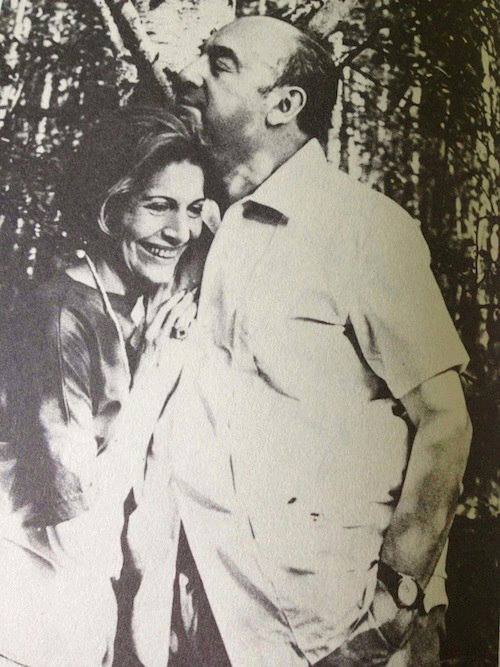
“I love you without knowing how, or when, or from where. I love you simply, without problems or pride: I love you in this way because I do not know any other way of loving but this, in which there is no I or you, so intimate that your hand upon my chest is my hand, so intimate that when I fall asleep your eyes close.”
-Pablo Neruda - 100 Love Sonnets.-
Photo: Matilde Urrutia and Pablo Neruda.
16 notes
·
View notes
Text
“If you forget me” by Pablo Neruda
The poem “If you forget me” is about someone’s lover, warning his/her lover what will happen if he/she fall out of love or forget him/her, but some says that this poem is about his homeland Chile. s the poem was written during Neruda’s exile at the time of Pinochet’s coup – though he could easily be referencing his lover and third wife, Matilde Urrutia. Capturing the emotional intensity of love along with its insecurities, perhaps Neruda is commenting on both. His roots in Chile and his relationship with Urrutia impacted him greatly and had a profound affect on his identity. One thing is for sure, Neruda’s words will never be forgotten.
1 note
·
View note
Text
Top 10 names (per country) to help name your characters- Europe addition p1
France:
Feminine:
Louise- famous warrior
Alice- noble
Chloe- blooming/fertility
Adele- noble
Franchoise- french woman
Bernadette- brave as a bear
Madeline- high tower
Aimee- beloved
Ninon- grace/flower/blossom
Audrey- strength
Masculine:
Gabriel- god is my strength
Adam- earth/man
Raphael- god has healed
Paul- small/humble
Louis- famous worrior
Arthur- noble
Alexandre- to defend/man
Victor- to conquer
Jules- shiney sky/father
Mohammed- praised
German:
Feminine:
Emma- universal
Mia- bitter
Hannah- grace
Emilia- rival
Sofia- wisdom
Lina- tender
Anna- grace
Mila- dear and gracious
Lea- weary/medow
Ella- fairy woman
Masculine:
Ben- son of...
Paul- small
Leon- lion
Finn- fair/white
Elias- yahweh is god
Jonas- dove
Luis- renowned worrior
Noah- rest and confort
Felix- happy/fortunate
Lukas- man from lucanus
Spain:
Masculine:
Hugo- heart/mind/spirit
Daniel- god is judge
Pablo- small
Martin- god of war
Alejendro- man/defender
Adrian- man from adrina/Hadria
Alvaro- elf army
David- beloved
Lucas- light
Manuel- god is with us
Feminine:
Lucia- light
Maria- sea of bitterness
Martina- god of war
Paula- small
Sofia- wisdom
Daniela- god is my judge
Alba- white
Julia- youth
Carla- free man
Sara- princess
England:
Masculine:
Oliver- olive tree
George- a farmer
Harry- Army power
Noah- rest and confort
Jack- god is gracious
Leo- a lion
Arther- noble
Muhammad- praised
Oscar- Devine strength
Charlie- strong
Feminine
Olivia- olive tree
Sophia- wisdom
Ava- bird/variation of Eve
Amelia- to strive/work
Isla- island
Lily- flower
Mia- bitter
Emily- rival
Isabella- devoted to god
Freya- goddess of love
Portugal
Femanine:
Maria- sea of bitterness
Leonor- light/moon
Matilde- might and strength
Beatriz- happiness/blessing
Carolina- free man
Marina- god of war
Ana- grace and mercy
Ines- lamb
Margarida- pearl
Sofia- Wisdom
Masculine:
Joäo- god is gracious
Martim- god of war
Rodrigo- fame/ruler
Santiago- saint
Francisco- French
Afonso- noble/ready
Tomas- twin
Miguel- like god
Guilherme- protection
Gabriel- god is my strength
Italian
Masculine:
Francesco- French
Alessandro- defender/worrior
Lorenzo- ...of laurentum
Andrea- manly
Leonardo- lion/brave
Mattia- gift of god
Matteo- gift of god
Gabriele- man of god
Riccardo- power/bravery
Tommaso- twin
Feminine:
Sofia- wisdom
Giula- youth
Aurora- dawn
Giorgia- earthworker
Martina- god of war
Emma- universal
Greta- pearl
Chiara- light/famous
Sara- princess
Alice- noble/light
11 notes
·
View notes
Text
"Now if you’d leave me in peace.
Now if you’d get on without me.
I am going to close my eyes
And I only want five things,
five favorite roots...
The first is love without end.
The second is to see autumn.
I cannot be without leaves
flying away and returning to earth.
Third is grave winter,
the rain I loved, the caress
of a fire in a wilderness of cold.
In fourth place is summertime
round like a watermelon.
The fifth thing is your eyes,
Matilde, my love, my beloved,
I don’t want to sleep without your eyes,
I don’t want to be without you seeing me:
I’d trade springtime
for your gaze still upon me.
My friends, all of that is what I want.
It’s nearly nothing and almost everything.
And now if you wish you may leave.
So much have I lived that one day
you’ll have to make yourselves forget me,
erasing the blackboard of me:
my heart was endless.
But just because I ask for silence
don’t go thinking I’m about to die:
au contraire!:
it so happens I am going to be lived.
It just so happens that I am and I keep being.
I will not be dying for within me
grains will grow,
first the kernels that break through
the ground to see light,
but mother earth is dark:
and inside me I am dark:
I am like a well in whose waters
the nighttime leaves her stars
and goes on alone through the fields.
This is about my having lived so much
that I want to live another much.
Never have I felt such resonance,
never have I had so many kisses.
Now, as always, it is early.
The light takes flight with her bees.
Leave me alone with this day.
I ask permission to be born."
~ Pablo Neruda
1 note
·
View note